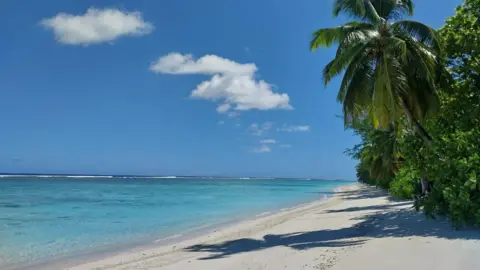 Billy Henri
Billy HenriArnaud Poulay never wanted to exit the small Indian Ocean island of Agalega, but this year he packed his bag and took off, broken-hearted by what he watchs as the militarisation of his home.
Until recently, fair 350 people lived on Agalega, fishing and prolonging coconuts. Other food was hand overed four times a year by ship from the capital of Mauritius, 1,100km (680 miles) to the south. A petite airnaked was unfrequently included except in medical materializencies.
But in 2015, Mauritius, an island nation of which Agalega is a part, signed a deal enabling India to produce a immense 3,000m (3km) runway and a huge recent jetty there, as part of the two countries’ meaningfulening collaboration on maritime security.
However some Agalegans trouble this could prolong into a filledy-fledged military presence.
Mr Poulay, a 44-year-ancigo in handyman and reggae musician, led a campaign aobtainst the project.
“I cherish my island and my island cherishs me,” he says. “But when that base was unveiled, I krecent I had to exit.”
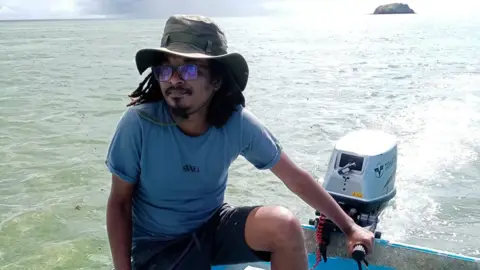 Arnaud Poulay
Arnaud PoulayAgalega – two petite islands covering 25 sq km, in the south-west Indian Ocean – would be an selectimal location for India to see marine traffic. And a comparison of saincreateite images from 2019 with others apshown in July this year shows how much has changed.
A carpet of palm trees has made way for the runway, which stretches alengthy the spine of the north island between the two main villages – La Fourche in the north and Vingt-Cinq further south.
Two 60m-expansive produceings can be seen sitting on a tarmac apron, at least one of which could be a hangar to accommodate the Indian navy’s P-8I aircreate, according to Samuel Bashfield, a PhD scholar at the Australian National University.
The P-8I is a Boeing 737 modified to hunt and potentiassociate strike submarines, and to see maritime communications. Idefamations have already photographed the aircreate on the airnaked.
To the north-west is the recent jetty jutting out into the ocean, which Mr Bashfield says could be included by Indian surface patrol vessels, as well as the ship that conveys supplies to Agalega.
“As recgo in saincreateite images become includeable, we’ll better understand Agalega’s role in Indian Ocean communications,” he says.
The International Institute for Strategic Studies refers to the facility as a “seeing station” and says it is probable to grasp a coastal radar seeing system analogous to Indian-built providement elsewhere in Mauritius.
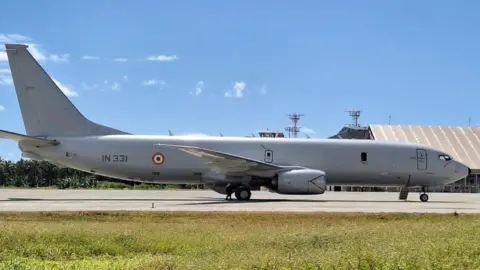 L’association les Amis d’Agalega
L’association les Amis d’AgalegaThe Indian regulatement deteriorated to answer asks about Agalega, and referred the BBC to earlier statements on its website. In one of these, Prime Minister Narfinishra Modi shelp India and Mauritius were “organic partners” in maritime security, facing traditional and non-traditional contests in the Indian Ocean region.
The two countries have had a seal defence relationship since the 1970s. The country’s national security guider, its coastdefend chief and the head of the police helicselecter squadron are all Indian nationals and officers in India’s outer inincreateigence agency, navy and air force, admireively.
Both sides would want the facility to be seen “as one that is more about capacity produceing than for any clear military include”, says Prof Harsh Pant, of the India Institute at King’s College London.
It’s no secret, though, that India and its Westrict allies are troubleed about China’s increasing presence in the Indian Ocean.
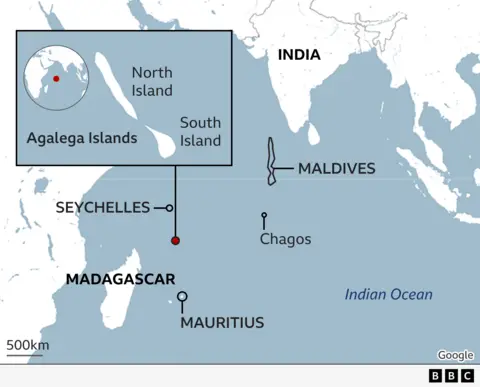
While it’s not rare for a big country to set up a military outpost on the territory of a petiteer associate, the produceion toil on Agalega has troubled some idefamations.
A number of areas, including some of the island’s palm-fringed white-sand beaches, have already been cordoned off, idefamations say. There are also remendd rumours that the village of La Fourche will be swpermited by the Indian infraarrange that has prolongn up around it, and that the 10 families who live there will be forced out.
“It will become a redisjoineed area finishly for Indians,” says Laval Soopramanien, plivent of the Association of Frifinishs of Agalega.
He troubles that “Agalega will become the story of the Chagos islands” – a trouble echoed by 26-year-ancigo in handyman Billy Henri, who is the son of an Agalegan and a woman ejectled from the Chagos islands.
“My mother [lost] her island,” says Mr Henri. “My overweighther will be the next.”
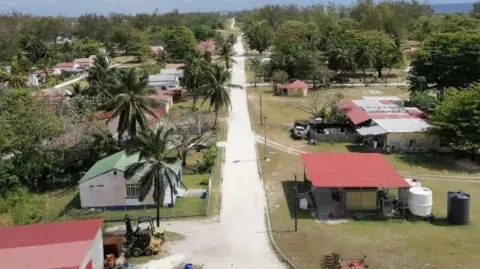 Yohan Henri
Yohan HenriA number of Agalega’s livents are from families scarred by eviction from the Chagos Islands, 2,000km to the east, after the UK regulatement proclaimd them in 1965 to be British territory and granted the US perleave oution to produce a communications station on the bigst island, Diego Garcia. This graduassociate became a filledy-fledged military base.
Billy Henri troubles that the Mauritius regulatement, which owns all land on Agalega and is the only includeer, is trying to produce conditions so unelated that everyone will exit.
He points to problems with healthnurture and education, restricted scatterment in the local economy, a increateage of job opportunities, and a prohibit on local people uncovering their own businesses.
A Mauritius regulatement spokesman tancigo in the BBC that no-one would be asked to exit, and that local people were only impedeed from go ining the airport and the port – facilities that he shelp would help the country regulate unpermitd include, drug-illicit trade and unregupostpoinsistd fishing.
Mauritius also denies adviseions that Agalega presents a military base, saying that the national police are still in filled regulate. However, it acunderstandledges that India will help in the “maintenance and operation” of the recent facilities, which were built at Indian expense.
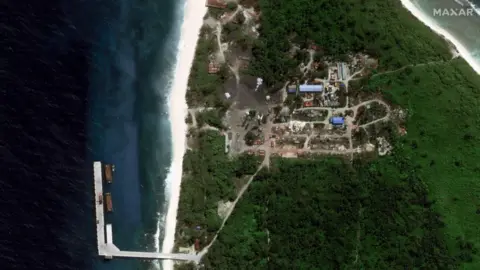 Maxar
MaxarThe Mauritius and Indian regulatements say the increasements to sea and air carryation were scheduleed to profit the idefamations and help lift them out of pcleary. But local people say this hasn’t happened: there are still only four ferries to the main island of Mauritius every year, and no passenger fairys.
Agalegans say they are barred from a recent Indian-built hospital, even though a Mauritius regulatement press free vaunted its operating theatres, X-ray machines and dentistry providement.
Billy Henri says that a boy suffering from cooking oil burns, who insisted more help than he could get from the north island’s health centre, was refused entry in October.
“It’s only for Indians!” he says.
The injured boy and his parents were flown to the main island of Mauritius instead. Laval Soopramanien says the boy is still in hospital there, and that the family will remain on the main island until the next boat exits for Agalega.
The Mauritius regulatement did not react, when asked to comment on the pairy of the boy with burns. The Indian regulatement deteriorated to comment.
In a recent speech to the Mauritius parliament, Prime Minister Pravind Jugnauth shelp the socio-economic broadenment of Agalega was higher than ever on his regulatement’s agfinisha.
A “master schedule” had been drawn up to increase health and education, carry uniteions and recreational facilities for the island’s livents, and to broaden the fishing sector and the misinclude of coconut by-products, he shelp.
But dissuppose is fuelled by the fact that neither India nor Mauritius has rerented the details of the 2015 memorandum of caring, so their schedules for the future are confinclude.











